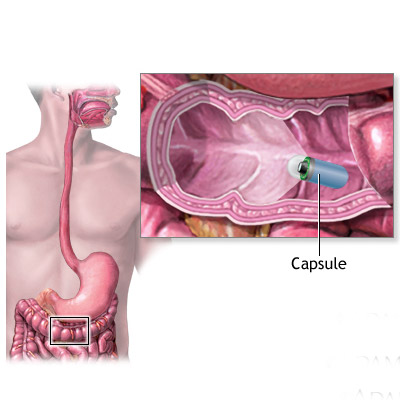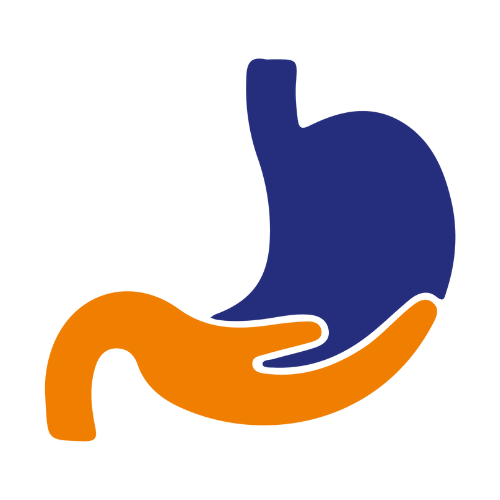
Capsule Endoscopy
What is a Capsule Endoscopy?
Capsule Endoscopy lets your doctor examine the lining of the middle part of your gastrointestinal tract, which includes the three portions of the small intestine (duodenum, jejunum, ileum). Your doctor will give you a pill sized video camera for you to swallow. This camera has its own light source and takes pictures of your small intestine as it passes through. These pictures are sent to a small recording device you have to wear on your body.

Why is Capsule Endoscopy
performed?
Capsule endoscopy helps your doctor evaluate the small intestine. This part of the bowel cannot be reached by traditional upper endoscopy or by colonoscopy. The most common reason for doing capsule endoscopy is to search for a cause of bleeding from the small intestine.
Capsule endoscopies help your doctor rule out possible conditions or make a diagnosis for issues such as:
- Early signs of gastrointestinal cancer
- Abdominal pain
- Crohn’s disease
- Celiac disease
- Unexplained bleeding
- Ulcers
It’s important to follow your doctor’s instructions when preparing for a capsule endoscopy.
- An empty stomach allows for the best and safest examination, so you should have nothing to eat or drink, including water, for approximately twelve hours before the examination. Your doctor will tell you when to start fasting.
- Tell your doctor in advance about any medications you take including iron, aspirin, bismuth subsalicylate products and other over-the-counter medications. You might need to adjust your usual dose prior to the examination.
- Discuss any allergies to medications as well as medical conditions, such as swallowing disorders and heart or lung disease.
- Tell your doctor of the presence of a pacemaker or defibrillator, previous abdominal surgery, or previous history of bowel obstructions in the bowel, inflammatory bowel disease, or adhesions.
- Your doctor may ask you to do a bowel prep/cleansing prior to the examination.
How one should prepare?
What to Expect During & After the Procedure
What Happens After Procedure?
After the procedure, remove the adhesive sensors and recording device. You will be able to drink clear liquids after two hours and eat a light meal after four hours following the capsule ingestion, unless your doctor instructs you otherwise. You will have to avoid vigorous physical activity such as running or jumping during the study. You do not need to retrieve or save the capsule (you may not even notice it passing). It can be safely flushed down the toilet.
Your doctor generally can tell you the test results within the week following the procedure; however, the results of some tests might take longer.
What to Expect During the Procedure?
A capsule endoscopy is a procedure that involves swallowing a small capsule, which is the size of a large vitamin pill. Inside the capsule is a tiny wireless camera that takes pictures as it passes through the small intestine. Images are transmitted to a recording device worn on a belt around your waist. This recording device saves the pictures for a specialist to look at and interpret at a later time. A capsule endoscopy may require taking a laxative before the procedure. You will also have fasting instructions for the day before and/or the day of the procedure, depending on whether you have a morning or afternoon appointment.
Before beginning the procedure, adhesive sensors will be placed on your abdomen and the recording device will be attached to your waist with a belt. You’ll then be given a glass of water to help swallow the capsule. You will not feel the capsule moving through your digestive tract.
What are the risks of Capsule Endoscopy?
In general, capsule endoscopy is a safe test that is noninvasive, and you don’t need to undergo sedation or anesthesia.
There is potential for the capsule to be stuck at a narrowed spot in the digestive tract resulting in bowel obstruction. This usually relates to a stricture (narrowing) of the digestive tract from inflammation, prior surgery, or tumor. It’s important to recognize obstruction early. Signs of obstruction include unusual bloating, abdominal pain, nausea or vomiting. You should call your doctor immediately for any such concerns. Also, if you develop a fever after the test, have trouble swallowing or experience chest pain, tell your doctor immediately. Be careful not to prematurely disconnect the system as this may result in loss of pictures being sent to your recording device.
While the capsule is in your body, stay away from any source of powerful electromagnetic fields, such as an MRI. An electromagnetic field may erase the data from the capsule and cause internal injury.
Contact us
Call Us
Email Us
info@arihantgastro.com
Our Location
A-Ground Floor, Lancelot Apartment, Opposite Kalyan Jewellers S.V. Road, Borivali West, Mumbai, Maharashtra 400092.
